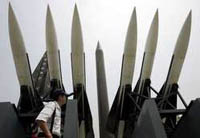Sanctions seen as dubious leverage over North Korea with little left to lose
Sanctions loom over North Korea for staging a nuclear test, but more punitive measures might have little effect on the already isolated, impoverished regime with little left to lose.

The potency of possible new restrictions is a wild card in the efforts of the U.N. Security Council, the United States and its allies to contain North Korea's nuclear ambitions and coax it back to negotiations.
International sanctions are "not effective at all," said Paik Hak-soon, a North Korea analyst at the Sejong Institute outside Seoul. "North Korea has already tested the bomb and has long expected this response."
The United States, Japan and others have slapped a series of sanctions on Pyongyang over its nuclear program in recent years. And the countries had indicated that similar consequences would be in store over a nuclear test, long before Monday's still-unconfirmed detonation.
Actions already taken range from blacklisting North Korean banks and restricting port entry of its ships to backing a global ban on trading some military technology with the North. In the wake of the crackdown, trade with Japan alone tumbled 85 percent, to a paltry $195 million last year, from 2001.
Yet North Korea went ahead and tested anyway.
"The truth is, there is little that Washington or Tokyo can do, politically or financially, that has not already been done," Ralph Cossa, president of the Honolulu-based Pacific Forum, wrote in a report on the standoff.
North Korea also has scoffed at more sanctions.
"We have lost enough," a North Korean official in Beijing was quoted as saying by South Korea's Yonhap news agency. "Sanctions can never be a solution."
But increasing sanctions may be all that's left. Military action or a strategic airstrike against North Korea is riskier than ever in the face of atomic retaliation.
Tougher measures hinge on whether China and Russia the North's closest allies support them. South Korea, which has long pursued a policy of engagement with its neighbor to ease tensions, is also a weak link, cautious not to spoil hard-won goodwill with its former enemy and further upset regional stability, reports AP.
Measures under consideration at the United Nations include international inspection of all cargo to and from North Korea to limit the proliferation of nuclear, chemical and biological weapons, and blanket bans on luxury and military goods and any material that could be used in the production of weapons of mass destruction.
A U.S. draft resolution contains tough new proposals from Japan to ban all countries from allowing in North Korean ships or aircraft carrying arms, nuclear or ballistic missile-related material or luxury goods.
Subscribe to Pravda.Ru Telegram channel, Facebook, RSS!


